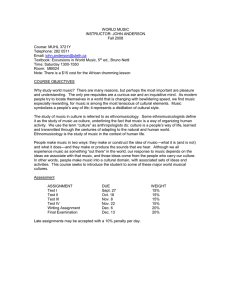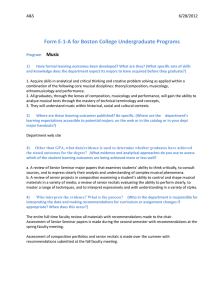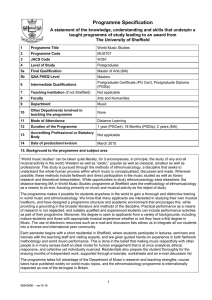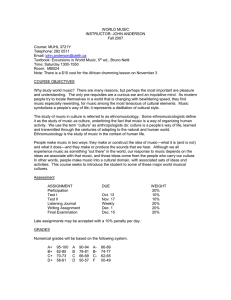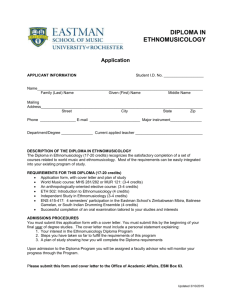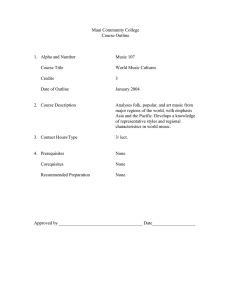Document 16110030
advertisement
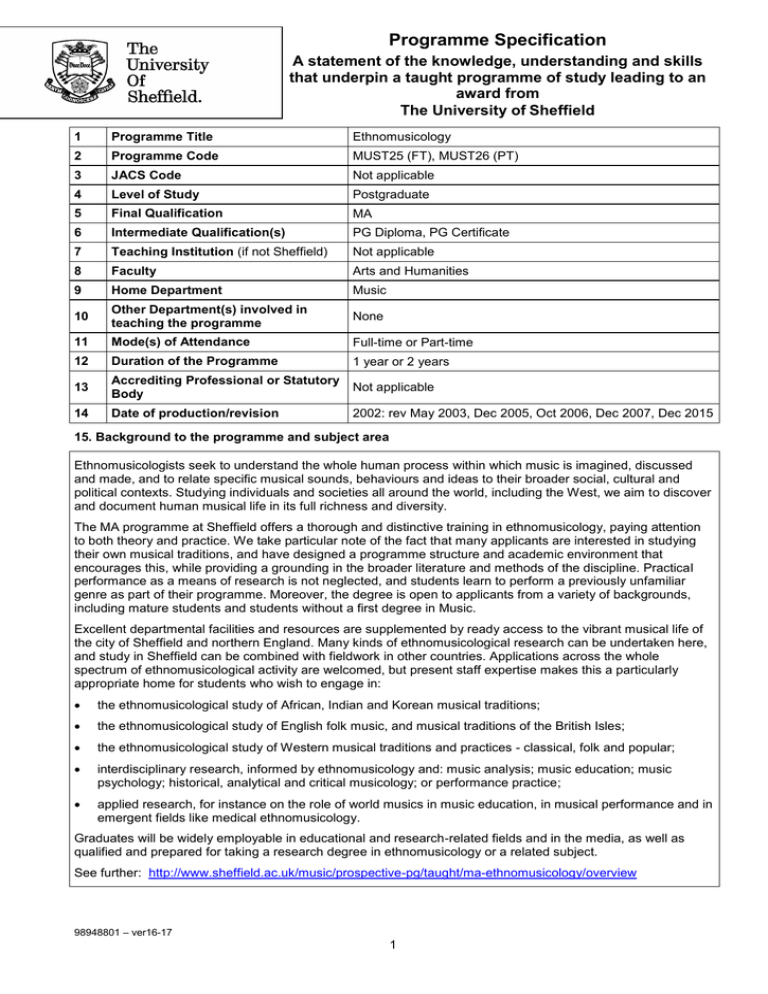
Programme Specification A statement of the knowledge, understanding and skills that underpin a taught programme of study leading to an award from The University of Sheffield 1 Programme Title Ethnomusicology 2 Programme Code MUST25 (FT), MUST26 (PT) 3 JACS Code Not applicable 4 Level of Study Postgraduate 5 Final Qualification MA 6 Intermediate Qualification(s) PG Diploma, PG Certificate 7 Teaching Institution (if not Sheffield) Not applicable 8 Faculty Arts and Humanities 9 Home Department Music 10 Other Department(s) involved in teaching the programme None 11 Mode(s) of Attendance Full-time or Part-time 12 Duration of the Programme 1 year or 2 years 13 Accrediting Professional or Statutory Body Not applicable 14 Date of production/revision 2002: rev May 2003, Dec 2005, Oct 2006, Dec 2007, Dec 2015 15. Background to the programme and subject area Ethnomusicologists seek to understand the whole human process within which music is imagined, discussed and made, and to relate specific musical sounds, behaviours and ideas to their broader social, cultural and political contexts. Studying individuals and societies all around the world, including the West, we aim to discover and document human musical life in its full richness and diversity. The MA programme at Sheffield offers a thorough and distinctive training in ethnomusicology, paying attention to both theory and practice. We take particular note of the fact that many applicants are interested in studying their own musical traditions, and have designed a programme structure and academic environment that encourages this, while providing a grounding in the broader literature and methods of the discipline. Practical performance as a means of research is not neglected, and students learn to perform a previously unfamiliar genre as part of their programme. Moreover, the degree is open to applicants from a variety of backgrounds, including mature students and students without a first degree in Music. Excellent departmental facilities and resources are supplemented by ready access to the vibrant musical life of the city of Sheffield and northern England. Many kinds of ethnomusicological research can be undertaken here, and study in Sheffield can be combined with fieldwork in other countries. Applications across the whole spectrum of ethnomusicological activity are welcomed, but present staff expertise makes this a particularly appropriate home for students who wish to engage in: the ethnomusicological study of African, Indian and Korean musical traditions; the ethnomusicological study of English folk music, and musical traditions of the British Isles; the ethnomusicological study of Western musical traditions and practices - classical, folk and popular; interdisciplinary research, informed by ethnomusicology and: music analysis; music education; music psychology; historical, analytical and critical musicology; or performance practice; applied research, for instance on the role of world musics in music education, in musical performance and in emergent fields like medical ethnomusicology. Graduates will be widely employable in educational and research-related fields and in the media, as well as qualified and prepared for taking a research degree in ethnomusicology or a related subject. See further: http://www.sheffield.ac.uk/music/prospective-pg/taught/ma-ethnomusicology/overview 98948801 – ver16-17 1 16. Programme aims This MA has the following aims consonant with the Mission Statement of the University of Sheffield: 1. to provide teaching that instils in students a thorough academic foundation in the subject of ethnomusicology; 2. to equip students with direct experience of a range of research skills and techniques; 3. to introduce students to a wide range of musical traditions, enriching their musical experience and their sensitivity to music’s many roles in human life; 4. to train students for further research at doctoral level, and for employment in pertinent fields; 5. to engender in students broader life skills, including: an ability to engage independently in self-directed study; critical thought and argument exercised through speech and writing in a variety of media; teamwork and leadership skills; and an ability to understand and respect the views of others. 17. Programme learning outcomes Knowledge and understanding - By the end of the programme PG Certificate students will have acquired K1-K5, PG Diploma students will have achieved K1-K6, and MA students will have achieved K1-K7: K1 develop a balance of intellectual understanding and musical experience through an integrated programme of ethnomusicological theory (research-led historical, social and analytical study) and practice (including performance, ethnography and fieldwork). K2 be able to reflect critically on their experience of music and explore in practice notions about the role of music in culture. K3 have developed a range of subject-specific knowledge informed by the latest research in ethnomusicology. K4 be able to respond sensitively to musical creativity and repertory in selected traditions from around the world. K5 be aware of ethical and legal issues relating to music and live music research. K6 have assimilated knowledge and techniques acquired during interdisciplinary study. K7 have inculcated a sense of intellectual self-reliance, such that they can confidently relate and apply knowledge and techniques acquired during their degree to situations in professional life. Skills and other attributes - By the end of the programme PG Certificate, PG Diploma, and MA students will: S1 be practiced in the application of subject-specific skills, informed by the latest research needs in ethnomusicology (such as use of notation and transcription, ethnographic observation and participation, and critical writing). S2 demonstrate personal and interpersonal skills (personal discipline, creativity, problem solving, organisation and planning, leadership, teamwork, etc.) particularly through research seminars and musical performance, including extra-curricular activities. S3 demonstrate technical and technological competence in a range of research-related areas, including information gathering and assessment (in libraries, archives, computers and the internet, through interviewing and observing, and by use of recording equipment, tools for sound analysis and musical instruments). S4 have prepared themselves for further postgraduate research and employment by developing analytical and presentational skills in both writing and oral media. MA students will additionally: S5 be skilled researchers capable of carrying out successful independent study at professional or research degree levels. 98948801 – ver16-17 2 18. Teaching, learning and assessment Development of the learning outcomes is promoted through the following teaching and learning methods: Supervisions play a vital role in the degree, ranging from discussions of subject-specific skills, informed by the latest research needs in ethnomusicology (S1), to provision of the opportunity to reflect in a supportive environment on the student’s personal musical experience (K2). General balancing of the different modes of learning (K1) also occurs there, as does the development of subject-specific knowledge (K3), sensitivity to music (K4), awareness of ethical considerations (K5), interdisciplinary knowledge (K6), and intellectual selfconfidence and professional skills (K7, S4). Seminars and oral presentations require students to reflect on material (K2, K4), to develop and apply analytical skills (S2), to work toward particular goals (S4), and to respond immediately to thoughts and materials introduced by others (K1, K3, K5, S1). Some seminars include group work, for instance in mastering technological skills (K5, S3). Seminars and presentations also involved working and sharing ideas with fellow students in other sub-disciplines of musical study, encouraging interdisciplinary engagement and reflection in relation to both theory and practice (K6, K7, S2, S4). Lectures are employed primarily to develop subject-specific knowledge and musical materials (K3, K4, K6), with ethical concerns introduced as well (K5). Also included is practice in the skills and techniques of ethnomusicological research through classroom exercises (S1), observation of teaching in world music (K3, K4, S2, S4), use of technology (S3) and presentational matters (S4). Practical study in music performance and ethnographic fieldwork is a broad field of activity that integrates many of the skills and learning outcomes already listed. Given the integrated nature of learning in live fieldwork situations, where knowledge feeds technical accomplishment and skill informs knowledge, it is not desirable to separate the individual outcomes embraced. Nevertheless, it is possible to state that making music respectfully with other people is in many senses itself an ideal model for human engagement that is at once analytical, ethical, responsive, and collective yet individually nuanced (K1, K4, K6, S1, S2, S3, S4). MA students will be able to lead activity in these areas confidently and effectively (K7). Opportunities to demonstrate achievement of the programme learning outcomes are provided through the following assessment methods: Assessment methods include: A supervised dissertation (summative) of 15,000 (Ethnomusicology Special Study A), or a supervised folio (of fieldwork materials, editions or analyses of an equivalent substance) is the major element of summative assessment in the degree, and successful completion is likely to require demonstration of learning outcomes across the whole range of K1-7 and S1-5, although the proportion of these will reflect the topic selected. Essays (summative) of between 300 and 3,000 words are required in Seminar in Ethnomusicology, Interdisciplinary Music Studies and Performing World Music, and in the optional module (see the course structure). Formative online discussion using MOLE plays a role in participation in Interdisciplinary Music Studies, and keeping of a (summative) regular online learning diary is also integrated into the module Performing World Music. Taken as a whole, these written assessments will demonstrate knowledge and skills across the range K1-7 and S1-5. The balance of each in any one module will follow the selection of topics for writing, but in any case all students will complete writings in a range of media, including literature and performance reviews (esp. K1, K3, K6, S1, S3, S4), responses to oral research presentations (esp. K1, K2, K4, K6, S1-4) and original essays (esp. K1, K2, K4, K6, S1, S3, S4). Students also complete (summative) learning diaries in the module Performing World Music and write (summative) pedagogic materials in the module Seminar in Ethnomusicology. Formative oral presentations of between 5 and 20 minutes are included in several of the modules that comprise this programme. Summative oral presentations are assessed as part of Seminar in Ethnomusicology (mini UG lecture) and Performing World Music. These allow a number of learning outcomes to be demonstrated (primarily K1, K2, K6, S2, S4). Recordings and practical performance form further (summative) assessed elements, the former in Ethnomusicology Special Study A and the latter in Performing World Music. The nature of knowledge and skills demonstrated will vary according to the nature of field recordings collected or performance undertaken but successful study will demonstrate a range of outcomes (primarily K3, K4, K5, S1, S2, S3). In Seminar in Ethnomusicology, students also complete a Transcription and Analysis of a world music audio excerpt as a specialist ethnomusicological methodology (K1, K4, K7, S1, S3, S4, S5). 98948801 – ver16-17 3 The structure and relative weighting of core and optional modules laid out in the course structure ensures that all students develop knowledge and skills across the list of learning outcomes, whilst developing individual-led pathways by the selection of optional modules. In order to cater for student-led specialisation in the latter part of the programme, there is some flexibility in the exact balance of assessed elements that will be demonstrated in the final assessment, a point that usefully reflects both individual student needs and the breadth of the subject area in question. 19. Reference points The learning outcomes have been developed to reflect the following points of reference: The MA in Ethnomusicology developed through reference to MA programmes in other UK and overseas universities. It draws on a research training core shared with other departmental MA degrees, and on the research specialisms of current members of staff. In designing and revising the degree structure, attention was also paid to student needs, as articulated by incoming postgraduates, those on other ethnomusicology degrees and by final-year undergraduates considering graduate study in this area. The appropriate QAA framework descriptors were also consulted and adhered to. In reviewing module structures, attention has also been paid to student evaluations by current postgraduates. Internally, reference was made to the University’s Mission Statement and to its Learning and Teaching Strategy. Fallback awards have been added to provide certification for students who find themselves unable to complete the full MA degree. 20. Programme structure and regulations The programme is structured around a core of modules designed to ensure coverage of essential elements of graduate study in music and key learning experiences in ethnomusicology itself. Research Techniques and Interdisciplinary Music Studies provide coverage of the essential methods of musical research, and a comparative exploration of theoretical perspectives and approaches to the study of music, respectively. While offering an interdisciplinary overview, the latter will also include carefully selected core readings in ethnomusicology. Performing World Music allows students to learn through participation and experience. Through an integrated curriculum of theoretical discussion, technical application and knowledge development, The Seminar in Ethnomusicology adds skills and resources that are directed at the specialist ethnomusicologist: techniques of transcription and analysis specific to ethnomusicological research, desk-based inquiry relating to a particular musical discipline, and theoretical discussion of a particular debate or issue are all covered, to provide the student with a thorough overview of the discipline’s key developments and practices. Ethnomusicology Special Study provides an opportunity for students to demonstrate their assimilation of this learning through completion of an original piece of research investigation, much of which may take the form of practical field research. In this module, students complete a 60-credit dissertation or folio of fieldwork materials. Students will also undertake 30 credits in one or two cognate disciplinary areas, such as but not limited to other Level M modules within music, area studies, folklore or modern languages. This option reflects the interdisciplinary nature of ethnomusicology as a subject that draws as much on social science research models as on those of the humanities. A student who has been awarded sixty credits in respect of modules listed at 1(a) in the regulations shall be eligible for the award of the Postgraduate Certificate in Ethnomusicology. A student who has been awarded one-hundred and twenty credits in respect of modules listed at 1(a) and (b)(i)(b) in the regulations shall be eligible for the award of the Postgraduate Diploma in Ethnomusicology. A student who has been awarded one-hundred and eighty credits in respect of modules listed at 1(a) in the regulations shall be eligible for the award of the MA in Ethnomusicology. Part-time candidates follow a pathway that divides the modules across two years of study. There is some flexibility in this, but typically candidates will take all or most of (a) in year one and any remaining elements of (a) and all of (b) in year 2. Detailed information about the structure of programmes, regulations concerning assessment and progression and descriptions of individual modules are published in the University Calendar available on-line at http://www.shef.ac.uk/govern/calendar/regs.html. 98948801 – ver16-17 4 21. Student development over the course of study Progression is ensured by the modular design of the degree and through tutorial support throughout the programme. The Department of Music operates a system of supervision documentation that explicitly call for reflection on steps taken so far and those planned for future weeks. Generic research skills are taught throughout the year, enabling delivery via the Graduate Study Days and, therefore, maximum engagement from the department’s multifaceted PGT cohort; progression is arranged within these from initial bibliographic work and mastery of technology to more professionally and vocationally directed subjects such as publication and career development (Research Techniques). Likewise, the guided critique of existing research across a deliberately catholic field is similarly conducted over the year (Interdisciplinary Music Studies). Modular progression is built into the subject-specific sector of the degree: Study and group discussion of key disciplinary readings (Seminar in Ethnomusicology) grounds the student’s growing experience of existing ethnomusicological research in practical and applied work (Performing World Music), in such a way as to support the independent application of newly acquired skills and knowledge through the development of an independent, inquiry-based dissertation/folio project in the second semester of the course (Ethnomusicology Special Study). This structure allows students time to establish personal interests and to prepare fieldwork activities, and to ensure that the student’s research builds on the disciplinary foundations of the core modules. Part-time students spread this degree over two years, as noted. In that case, coherent progression of options is a primary consideration for the Director of the MA in Ethnomusicology in approving a proposed timetable of study for a particular candidate. 22. Criteria for admission to the programme Detailed information regarding admission to the programme is available at http://www.shef.ac.uk/postgraduate/. Applicants will normally hold a 2:1 degree (or equivalent) in a subject in one of the humanities or social sciences. A record of musical experience is also required, and should be demonstrated by all applicants. Mature students are encouraged to apply, and life and work experience can be equated to previous degree work. Students who are not native speakers of English will have attained IELTS level 6.5 (with a minimum of 5.5 in each element) or equivalent. 23. Additional information Applicants should refer to the series of webpages begun on http://www.sheffield.ac.uk/music/prospectivepg/taught/ma-ethnomusicology/overview The Department has also produced a brochure with further information on postgraduate studies in ethnomusicology, including this MA. This specification represents a concise statement about the main features of the programme and should be considered alongside other sources of information provided by the teaching department(s) and the University. In addition to programme specific information, further information about studying at The University of Sheffield can be accessed via our Student Services web site at http://www.shef.ac.uk/ssid/. 98948801 – ver16-17 5

